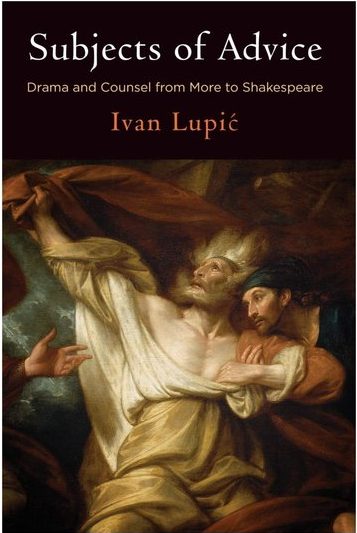Book Reviews
Review of Ivan Lupić’s Subjects of Advice
 “Not being counseled is bad, but being so is much worse,” claims a worried Ragusan merchant in a sixteenth-century comedy. The merchant’s words, as noted in Ivan Lupić’s excellent book, cleverly articulate early modern ambivalence towards the idea of counsel. Subjects of Advice – Drama and Counsel from More to Shakespeare (University of Pennsylvania Press, 2019) rethinks the relation between those who give and receive advice; reconsiders the way advice is framed in the literature of counsel; and reassesses the connection between drama and counsel, showing how counsel was “an ingrained cultural habit, a feature of obligatory, mental, moral, and political hygiene” (2). This way of thinking about the topic allows Lupić to prove how it is not only moral and political but also performative. Being a subject of advice, the author writes, is “to be reminded that the self is work in progress, fashioned and maintained through repeated challenges to one’s own wisdom. To take counsel is not to be merely subjected to advice; it is to become an active subject of it” (15). The book’s five chapters display Lupić’s mastery of the literature on counsel and his extensive knowledge of early modern drama, as well as his ability to place each play in historical context and to establish uncanny relations between works such as Gorboduc (1565) and Cambyses (1569).
“Not being counseled is bad, but being so is much worse,” claims a worried Ragusan merchant in a sixteenth-century comedy. The merchant’s words, as noted in Ivan Lupić’s excellent book, cleverly articulate early modern ambivalence towards the idea of counsel. Subjects of Advice – Drama and Counsel from More to Shakespeare (University of Pennsylvania Press, 2019) rethinks the relation between those who give and receive advice; reconsiders the way advice is framed in the literature of counsel; and reassesses the connection between drama and counsel, showing how counsel was “an ingrained cultural habit, a feature of obligatory, mental, moral, and political hygiene” (2). This way of thinking about the topic allows Lupić to prove how it is not only moral and political but also performative. Being a subject of advice, the author writes, is “to be reminded that the self is work in progress, fashioned and maintained through repeated challenges to one’s own wisdom. To take counsel is not to be merely subjected to advice; it is to become an active subject of it” (15). The book’s five chapters display Lupić’s mastery of the literature on counsel and his extensive knowledge of early modern drama, as well as his ability to place each play in historical context and to establish uncanny relations between works such as Gorboduc (1565) and Cambyses (1569).
The figure of Thomas More as subject of advice is the main topic of the book’s first chapter “Playing Good Counsel.”…
Please login or subscribe to continue reading.
Please subscribe to The Shakespeare Newsletter to continue reading.
Subscribe Now